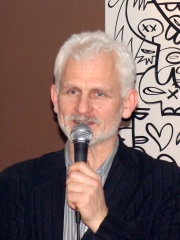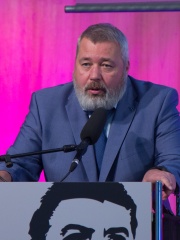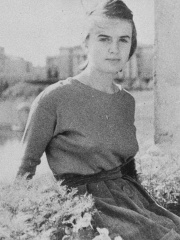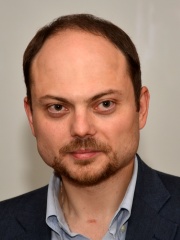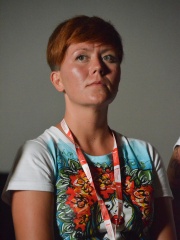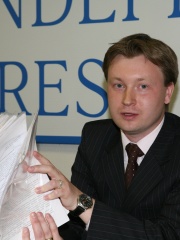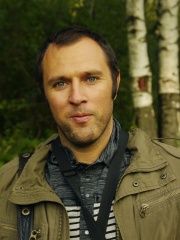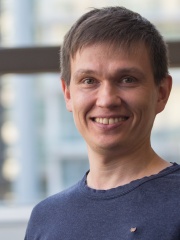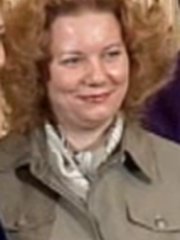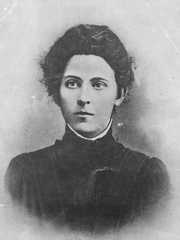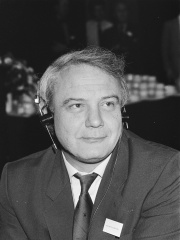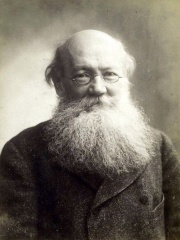
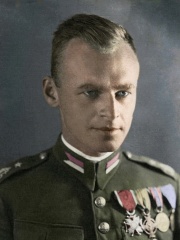
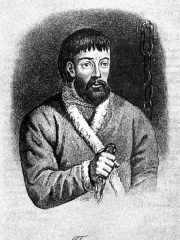
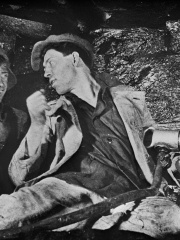
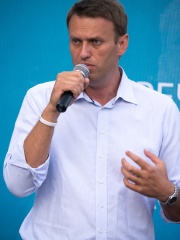
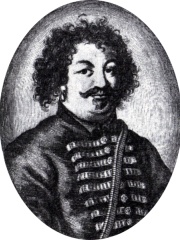
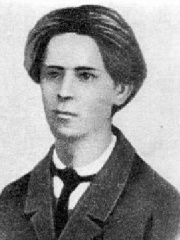
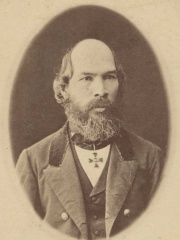
The Most Famous
SOCIAL ACTIVISTS from Russia
This page contains a list of the greatest Russian Social Activists. The pantheon dataset contains 840 Social Activists, 49 of which were born in Russia. This makes Russia the birth place of the 4th most number of Social Activists behind India, and United Kingdom.
Top 10
The following people are considered by Pantheon to be the top 10 most legendary Russian Social Activists of all time. This list of famous Russian Social Activists is sorted by HPI (Historical Popularity Index), a metric that aggregates information on a biography's online popularity. Visit the rankings page to view the entire list of Russian Social Activists.

1. Peter Kropotkin (1842 - 1921)
With an HPI of 78.36, Peter Kropotkin is the most famous Russian Social Activist. His biography has been translated into 79 different languages on wikipedia.
Pyotr Alexeyevich Kropotkin (9 December [O.S. 27 November] 1842 – 8 February 1921) was a Russian anarchist and geographer known as a proponent of anarchist communism. Born into an aristocratic land-owning family, Kropotkin attended the Page Corps and later served as an officer in Siberia, where he participated in several geological expeditions. He was imprisoned for his activism in 1874 and managed to escape two years later. He spent the next 41 years in exile in Switzerland, France (where he was imprisoned for almost four years), and England. While in exile, he gave lectures and published widely on anarchism and geography. Kropotkin returned to Russia after the Russian Revolution in 1917, but he was disappointed by the Bolshevik state. Kropotkin was a proponent of the idea of decentralized communist society free from central government and based on voluntary associations of self-governing communities and worker-run enterprises. He wrote many books, pamphlets and articles, the most prominent being The Conquest of Bread (1892) and Fields, Factories, and Workshops (1899), with Mutual Aid: A Factor of Evolution (1902) being his principal scientific offering. He contributed the article on anarchism to the eleventh edition of the Encyclopædia Britannica and left an unfinished work on anarchist ethical philosophy.

2. Witold Pilecki (1901 - 1948)
With an HPI of 73.47, Witold Pilecki is the 2nd most famous Russian Social Activist. His biography has been translated into 45 different languages.
Witold Pilecki (Polish: [ˈvitɔlt piˈlɛt͡skʲi] ; 13 May 1901 – 25 May 1948), known by the codenames Roman Jezierski, Tomasz Serafiński, Druh and Witold, was a Polish World War II cavalry officer, intelligence agent, and resistance leader. As a youth, Pilecki joined Polish underground scouting; in the aftermath of World War I, he joined the Polish militia and, later, the Polish Army. He participated in the Polish–Soviet War, which ended in 1921. In 1939, he participated in the unsuccessful defense of Poland against the invasion by Nazi Germany, the Slovak Republic, and the Soviet Union. Shortly afterward, he joined the Polish resistance, co-founding the Secret Polish Army resistance movement. In 1940, Pilecki let himself be captured by the occupying Germans in order to be voluntarily sent to the Auschwitz concentration camp and infiltrate it. At Auschwitz, he organized a resistance movement that eventually included hundreds of inmates, and he secretly drew up reports detailing German atrocities at the camp, which were smuggled out to Home Army headquarters and shared with the Western Allies. After escaping from Auschwitz in April 1943, Pilecki fought in the Warsaw Uprising of August–October 1944. Following its suppression, he was interned in a German prisoner-of-war camp. After the communist takeover of Poland, he remained loyal to the London-based Polish government-in-exile. In 1945, he returned to Poland to report the situation in Poland back to the government-in-exile. Before returning, Pilecki compiled his previous reports into Witold's Report to detail his Auschwitz experiences, anticipating that he might be killed by Poland's new communist authorities. In 1947, he was arrested by the secret police on charges of working for "foreign imperialism" and, after being subjected to torture and a show trial, was executed in 1948. His story, inconvenient to the Polish communist authorities, remained mostly unknown for several decades; one of the first accounts of Pilecki's mission to Auschwitz was given by Polish historian Józef Garliński, himself a former Auschwitz inmate who emigrated to Britain after the war, in Fighting Auschwitz: The Resistance Movement in the Concentration Camp (1975). Several monographs appeared in subsequent years, particularly after the fall of communism in Poland facilitated research into his life by Polish historians.

3. Yemelyan Pugachev (1742 - 1775)
With an HPI of 73.44, Yemelyan Pugachev is the 3rd most famous Russian Social Activist. His biography has been translated into 57 different languages.
Yemelyan Ivanovich Pugachev (also spelled Pugachyov; Russian: Емельян Иванович Пугачёв; c. 1742 – 21 January [O.S. 10 January] 1775) was an ataman of the Yaik Cossacks and the leader of the Pugachev's Rebellion, a major popular uprising in the Russian Empire during the reign of Catherine the Great. The son of a Don Cossack landowner, Pugachev served in the Imperial Russian Army during the Seven Years' War and the Russo-Turkish War of 1768–1774. In 1770 he deserted the Russian military and spent years as a fugitive, gaining popularity among the peasants, Cossacks and Old Believers against a backdrop of intensified unrest. In 1773, he initiated open revolt against Catherine. Claiming to be Catherine's late husband Tsar Peter III, Pugachev proclaimed an end to serfdom and amassed a large army. His forces quickly overran much of the region between the Volga and the Urals, and in 1774 they captured Kazan and burned the city to the ground. In August 1774, General Johann von Michelsohnen inflicted a crushing defeat on the rebels at Tsaritsyn. Pugachev was captured soon after by his own Cossacks and turned over to the authorities. He was then sent to Moscow and executed in January 1775. Alexander Pushkin wrote a notable history of the rebellion, The History of Pugachev, and recounted the events of the uprising in his novel The Captain's Daughter (1836).

4. Alexey Stakhanov (1906 - 1977)
With an HPI of 72.17, Alexey Stakhanov is the 4th most famous Russian Social Activist. His biography has been translated into 42 different languages.
Alexei Grigoryevich Stakhanov (Russian: Алексе́й Григо́рьевич Стаха́нов, IPA: [stɐˈxanəf], Alekséy Grigór'yevich Stakhánov; 3 January 1906 – 5 November 1977) was a Soviet miner, Hero of Socialist Labour (1970), and a member of the CPSU (1936). He became a celebrity in 1935 as part of what became known as the Stakhanovite movement—a campaign intended to increase worker productivity and to demonstrate the superiority of the socialist economic system.
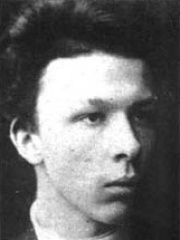
5. Aleksandr Ulyanov (1866 - 1887)
With an HPI of 71.08, Aleksandr Ulyanov is the 5th most famous Russian Social Activist. His biography has been translated into 41 different languages.
Aleksandr Ilyich Ulyanov (Russian: Алекса́ндр Ильи́ч Улья́нов; 12 April [O.S. 31 March] 1866 – 20 May [O.S. 8 May] 1887) was a Russian revolutionary and political activist who was executed for planning an assassination against Alexander III of Russia. He was the elder brother of Vladimir Lenin, the founder of the Soviet Union; his execution pushed his younger brother into activism.

6. Alexei Navalny (1976 - 2024)
With an HPI of 70.52, Alexei Navalny is the 6th most famous Russian Social Activist. His biography has been translated into 108 different languages.
Alexei Anatolyevich Navalny (Russian: Алексей Анатольевич Навальный, IPA: [ɐlʲɪkˈsʲej ɐnɐˈtolʲjɪvʲɪtɕ nɐˈvalʲnɨj]; 4 June 1976 – 16 February 2024) was a Russian opposition leader, anti-corruption activist and political prisoner. He founded the Anti-Corruption Foundation (FBK) in 2011. He was recognised by Amnesty International as a prisoner of conscience and was awarded the Sakharov Prize for his work on human rights. Through his social media accounts, Navalny and his team published material about corruption in Russia, organised political demonstrations and promoted his campaigns. In a 2011 interview, he described Russia's ruling party—United Russia—as a "party of crooks and thieves", which became a popular byname. Navalny and the FBK have published investigations detailing alleged corruption by high-ranking Russian officials and their associates. Navalny twice received a suspended sentence for embezzlement, in 2013 and 2014. Both criminal cases have been widely considered politically motivated and intended to bar him from running in future elections. He ran in the 2013 Moscow mayoral election and came in second with 27.2% of the vote, but was barred from running in the 2018 presidential election. In August 2020, Navalny was hospitalised after being severely poisoned with a Novichok nerve agent. He was medically evacuated to Berlin and discharged a month later. He accused President Vladimir Putin of being responsible for his poisoning, and an investigation implicated agents from the Federal Security Service. In January 2021, Navalny returned to Russia and was immediately detained on accusations of violating parole conditions while hospitalised in Germany. Following his arrest, mass protests were held across Russia. The next month, Navalny's suspended sentence was replaced with a prison sentence of over 2+1⁄2 years' detention, and his organisations were later designated as extremist and liquidated. In March 2022, Navalny was sentenced to an additional nine years in prison after being found guilty of embezzlement and contempt of court in a new trial described as a sham by Amnesty International. Following the rejection of his appeal, Navalny was transferred to a high-security prison in June. In August 2023, he received another sentence of 19 years on extremism charges. In December 2023, Navalny went missing from prison for almost three weeks. He re-emerged in an Arctic Circle corrective colony in the Yamalo-Nenets Autonomous Okrug. In 2024, the Russian prison service reported that Navalny had died, which subsequently sparked protests in both Russia and various other countries. Accusations against Putin's government in connection with his death have been made by many Western governments and international organisations.

7. Stenka Razin (1630 - 1671)
With an HPI of 70.28, Stenka Razin is the 7th most famous Russian Social Activist. His biography has been translated into 51 different languages.
Stepan Timofeyevich Razin (Russian: Степа́н Тимофе́евич Ра́зин, pronounced [sʲtʲɪˈpan tʲɪmɐˈfʲe(j)ɪvʲɪtɕ ˈrazʲɪn]; c. 1630 – June 16 [O.S. June 6] 1671), known as Stenka Razin (Сте́нька [ˈsʲtʲenʲkə]), was a Don Cossack leader who led a major uprising against the nobility and tsarist bureaucracy in southern Russia in 1670–1671.

8. Sergey Nechayev (1847 - 1882)
With an HPI of 67.52, Sergey Nechayev is the 8th most famous Russian Social Activist. His biography has been translated into 27 different languages.
Sergei Gennadiyevich Nechaev (Russian: Сергей Геннадиевич Нечаев; 2 October [O.S. 20 September] 1847 – 3 December [O.S. 21 November] 1882) was a Russian anarcho-communist, part of the Russian nihilist movement, known for his single-minded pursuit of revolution by any means necessary, including revolutionary terror. Nechaev fled Russia in 1869 after having been involved in the murder of a former comrade (Ivan Ivanov), who disagreed with some actions of Nechaevites. Complicated relationships with fellow revolutionaries caused him to be expelled from the International Workingmen's Association. Arrested in Switzerland in 1872, he was extradited back to Russia, where he received a twenty-year sentence and died in prison.

9. Ilya Ulyanov (1831 - 1886)
With an HPI of 67.37, Ilya Ulyanov is the 9th most famous Russian Social Activist. His biography has been translated into 28 different languages.
Ilya Nikolayevich Ulyanov (Russian: Илья Николаевич Ульянов; 31 July [O.S. 19 July] 1831 – 24 January [O.S. 12 January] 1886) was a Russian public figure in the field of public education. He was the father of revolutionary Vladimir Lenin, who became a Bolshevik leader and founder of the Soviet Union, and Aleksandr Ulyanov, who was executed for his attempt to assassinate Tsar Alexander III in 1886.
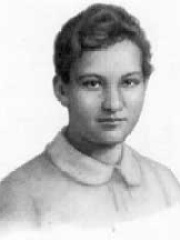
10. Zoya Kosmodemyanskaya (1923 - 1941)
With an HPI of 67.20, Zoya Kosmodemyanskaya is the 10th most famous Russian Social Activist. Her biography has been translated into 44 different languages.
Zoya Anatolyevna Kosmodemyanskaya (Russian: Зо́я Анато́льевна Космодемья́нская, IPA: [ˈzojə kəsmədʲɪˈmʲjanskəjə]; 13 September 1923 – 29 November 1941) was a Soviet partisan. She was executed after acts of sabotage against the invading armies of Nazi Germany. After stories emerged of her defiance towards her captors, she was posthumously declared a Hero of the Soviet Union. She became one of the most revered heroines of the Soviet Union.
People
Pantheon has 48 people classified as Russian social activists born between 1630 and 1984. Of these 48, 10 (20.83%) of them are still alive today. The most famous living Russian social activists include Ales Bialiatski, Dmitry Muratov, and Marina Oswald Porter. The most famous deceased Russian social activists include Peter Kropotkin, Witold Pilecki, and Yemelyan Pugachev. As of April 2024, 2 new Russian social activists have been added to Pantheon including Lidia Yusupova, and Veronika Marchenko.
Living Russian Social Activists
Go to all RankingsAles Bialiatski
1962 - Present
HPI: 65.11
Dmitry Muratov
1961 - Present
HPI: 63.75
Marina Oswald Porter
1941 - Present
HPI: 58.09
Vladimir Kara-Murza
1981 - Present
HPI: 52.30
Anna Hutsol
1984 - Present
HPI: 48.43
Lidia Yusupova
1961 - Present
HPI: 46.60
Nikolay Alexeyev
1977 - Present
HPI: 43.58
Suren Gazaryan
1974 - Present
HPI: 42.69
Farhad Fatkullin
1979 - Present
HPI: 42.61
Veronika Marchenko
1969 - Present
HPI: 40.80
Deceased Russian Social Activists
Go to all RankingsPeter Kropotkin
1842 - 1921
HPI: 78.36
Witold Pilecki
1901 - 1948
HPI: 73.47
Yemelyan Pugachev
1742 - 1775
HPI: 73.44
Alexey Stakhanov
1906 - 1977
HPI: 72.17
Aleksandr Ulyanov
1866 - 1887
HPI: 71.08
Alexei Navalny
1976 - 2024
HPI: 70.52
Stenka Razin
1630 - 1671
HPI: 70.28
Sergey Nechayev
1847 - 1882
HPI: 67.52
Ilya Ulyanov
1831 - 1886
HPI: 67.37
Zoya Kosmodemyanskaya
1923 - 1941
HPI: 67.20
Maria Spiridonova
1884 - 1941
HPI: 66.04
Vladimir Bukovsky
1942 - 2019
HPI: 65.03
Newly Added Russian Social Activists (2025)
Go to all RankingsOverlapping Lives
Which Social Activists were alive at the same time? This visualization shows the lifespans of the 25 most globally memorable Social Activists since 1700.

